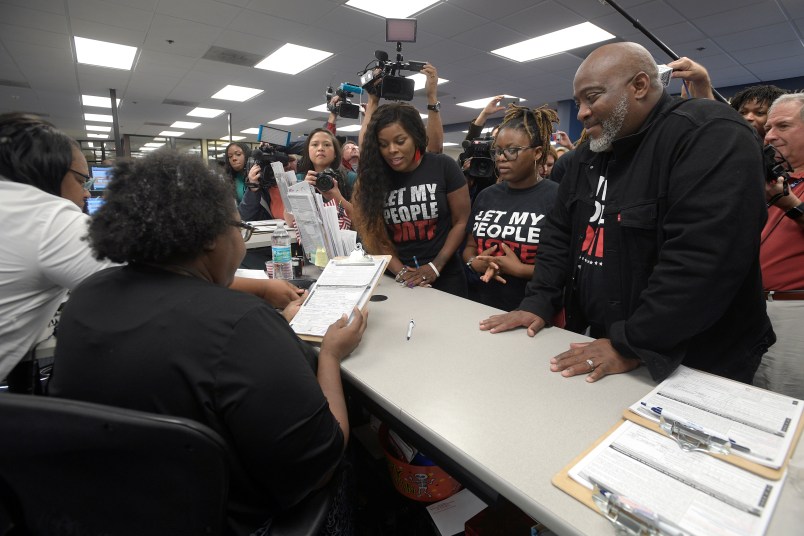A federal appeals court on Wednesday sided with ex-felons who sued Florida over a recent GOP law that undermined a 2018 constitutional amendment giving ex-felons the right to vote in the state.
Previously, a district court temporarily halted the new law from preventing those ex-felons from voting because they had not paid back various court fees and were too poor to do so. The law, requiring that ex-felons pay off all court fees before they regain the right to vote, was passed by Republicans last summer.
A panel of judges from the the 11th U.S. Circuit Court of Appeals upheld that lower court’s order on Wednesday, finding that the challengers were likely to succeed on the merits of proving the state violated the Constitution’s equal protection clause.
“The long and short of it is that once a state provides an avenue to ending the punishment of disenfranchisement — as the voters of Florida plainly did — it must do so consonant with the principles of equal protection,” the appeals court said.
The move was the latest shot in a complicated and escalating legal fight over the felon enfranchisement constitutional amendment, known as Amendment 4, that was broadly approved by Florida voters in 2018.
“It is undeniable that the [2019 law’s legal financial obligation] requirement punishes those who cannot pay more harshly than those who can,” the appeals court said Wednesday.
The appellate panel pointed to the system laid out by the district court that would allow Florida to confirm that an ex-felon who owes court fees is genuinely unable to pay them back before the state grants him or her the right to vote.
“To comply with the legal principle behind the injunction, the State need make only a good faith effort to ensure that no felon otherwise eligible to vote under Amendment 4 is prevented from doing so because of his or her genuine inability to pay [legal financial obligations,” the appellate panel said.
The appeals court also said that the evidence that was put forward during the proceedings for the preliminary order “casts a shadow on the State’s theory that the impecunious plaintiffs are the exception rather than the rule.”
The evidence, albeit limited, suggested to the appeals court “that a substantial number of felons—maybe a majority, maybe even a great majority—are like these plaintiffs who claim to be genuinely unable to pay their LFOs and would be precluded from voting under Florida’s scheme on account of wealth. ”
It’s unclear what effect the order, which will be appealed, will have on felon voting rights come the 2020 election. The district court’s order focused on the specific ex-felons who sued the state and were prevented from voting due to their inability to pay back the court fees.
According to a statement from the Campaign Legal Center, one of the voting rights groups involved in the legal challenge, the appeals court went further by “announcing a landmark principle that requiring payment of legal financial obligations as a condition of voting is unconstitutional as applied to those who are genuinely unable to pay.”
Meanwhile, a spokesperson for Gov. Ron DeSantis (R), who is a defendant in the lawsuit, told TPM that the governor’s office disagreed with the ruling and that they would seek a review from the full 11th Circuit Appeals Court.
Read the appeals court’s decision below:
Update: This story has been updated to include a statement from the governor’s office.



